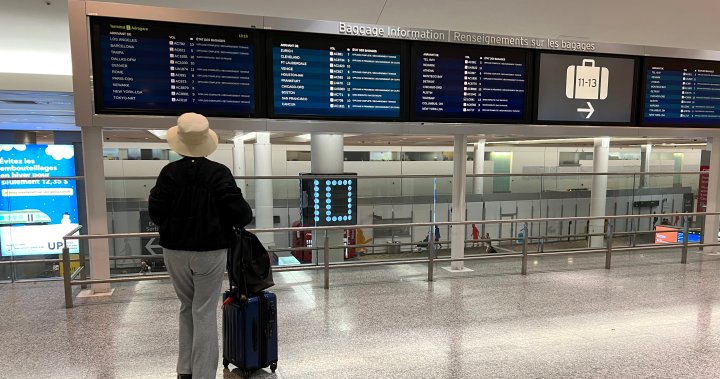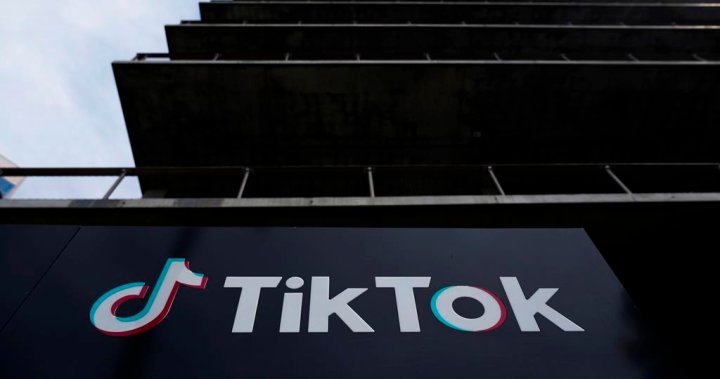An averted strike at WestJet and fresh data showing punctual performances from major airports and airlines in Canada bode well for travellers gearing up for summer getaways, analysts say.
WestJet warned this week that 250,000 Canadians could have their Canada Day long weekend plans disrupted due to a looming strike among engineers at the Calgary-based airliner.
While dozens of flights were cancelled in the lead-up to the Friday evening deadline, the federal government stepped in late Thursday to order the parties into binding arbitration, quashing the possibility of a long weekend work stoppage.
Duncan Dee, former chief operating officer at Air Canada, told Global News Morning on Friday the move came just before WestJet would have had to announce sweeping cancellations for the days ahead, marking a turbulent start to the busy summer travel season.
Dee said that with the federal government’s order, WestJet and the Aircraft Mechanics Fraternal Association should be “well on their way” to a new collective agreement.
“We should hopefully see some labour peace at WestJet at least that will take us through the peak of the summer,” he said. “I think we’re generally smooth skies ahead.”

‘Expect less pain at the airports’: analyst
Aviation analytics firm Cirium meanwhile released data on Friday showing what it called “solid” on-time performances among all major Canadian air carriers this spring.
Mike Malik, chief marketing officer at Cirium, told Global News that Canada’s air carriers, which have sometimes ranked poorly when compared to other airlines in North America, have so far been showing up for travellers in 2024.
Financial news and insights
delivered to your email every Saturday.
“You can expect less pain at the airports and with the airlines,” Malik says. “They’re all laser focused on on time performance.”
Among large North American carriers, WestJet ranked third for on-time performance in May with 82 per cent. Air Canada flew in at sixth with an on-time performance rate of 74 per cent.
Compare that to Cirium’s 2023 results, which had Air Canada at the bottom of the top 10 with a 63 per cent on-time performance for the year. WestJet was somewhat higher at 69 per cent in 2023. Delta Air Lines was top of the pack last year with an on-time percentage of nearly 85 per cent.
Porter Airlines this month is topping the list in Canada for completion factor, which compares the number of flights scheduled to those that actually took off. So far in June, Porter has touted a completion rate of 99.52 per cent, though WestJet, Flair Airlines and Air Canada were all close behind, each holding above 97 percent.
Toronto’s Pearson International Airport is also showing signs of “marked improvement,” according to Cirium, with a growing proportion of planes taking off on time from the travel hub.

An average of 70 per cent of flights have left Pearson within roughly 15 minutes of the scheduled departure so far in 2024, Cirium data shows. That compares to a rate of 59 per cent in June 2023.
Pearson has, at times, been a poster child of Canadian airport dysfunction during the travel industry’s recovery from the COVID-19 pandemic. Malik says that Canada’s biggest airport has “taken its fair share of knocks,” but should be lauded for its improvements made since.
“You have to give it to Toronto Pearson. They’ve done a fantastic job over the past year,” he says.
Canada’s most punctual airport in May was Calgary International Airport, however, with 77 per cent of the 6,000 flights scheduled in the month taking off within 15 minutes of the expected departure.
More competitive fares in the cards
Despite the collapse of low-cost carrier Lynx Air earlier in the year, Cirium says that the number of seats flown in Canada’s domestic market is up six per cent so far in 2024.
Porter is making inroads in the market with the delivery of new jets allowing the airline to increase its domestic flying by 63 per cent this July compared to last year, according to Cirium. WestJet is also set to bump its year-over-year seats flown by eight per cent in July, while Flair is scaling back at 7.5 per cent fewer seats.
Malik says the loss of Lynx has not yet lessened overall competition levels in the market with other carriers boosting their seat capacities in response.
“The chairs are being shifted,” he says. “There’s more capacity being added by Porter. There’s more capacity being added by WestJet. So you’ll find that because of that, the airfares will become competitive.”
In the domestic Canadian market, the cost of economy airfare in March 2024 was up 17 per cent year-over-year, averaging out to nearly $267 per one-way flight before taxes and fees.

The cost of flights has been cited as a driver of inflation in recent months, with Statistics Canada noting that air transportation was up 4.5 per cent annually in May. Much of the monthly increases were driven by flights to the United States, the agency said.
For Canadians heading overseas this summer, there’s some good news in the Cirium data when it comes to transatlantic airfares.
Air Canada, Air Transat and WestJet are all boosting their capacity heading overseas this summer as well, with Cirium pointing to the Paris Olympics and European Taylor Swift concerts as driving demand.
Cirium data shows that for flights from Canada to Europe, airfare levels are stable year-over-year. Comparing March this year to last, the average cost of a one-way flight before taxes and fees was almost $525 — the same as last year, according to Cirium.
“The airfares across the Atlantic are going to be relatively the same as they were last year. So there’s some good deals to be had,” Malik says.
— with files from Global News’s Anne Gaviola
© 2024 Global News, a division of Corus Entertainment Inc.





